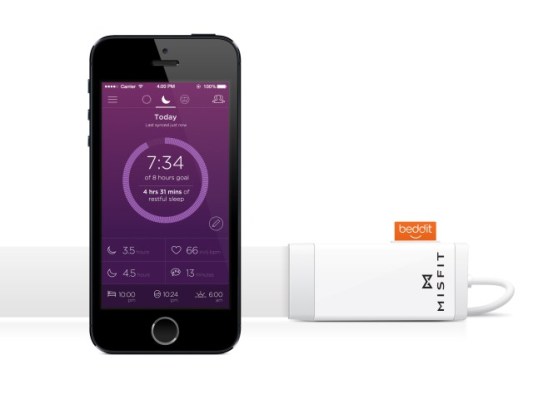The hardware wearable business is a tough gig, and today brings another reminder: Fitness and activity tracking startup Misfit has announced a new partnership with Beddit, a hardware maker that builds a smart sleep-monitoring system. The Beddit deal brings a co-branded device to Misfit’s lineup of offering, allowing the Misfit app to now also track advanced sleep information.
Beddit allows Misfit users to measure things like respiration, heart rate, movement, snoring and ambient noise while they’re snoozing, with a thin sensor that resides between the user’s sheets and their bed. It’s designed to not even offer a pea-sized element of potential discomfort to a sleeper, and adds much more complexity versus the sleep tracking that Misfit’s Shine wearable already offered.
The Misfit Shine was introduced last year, offering a wrist-worn tracker with special attention paid to design and fashion appeal. This wearable has received good reviews from critics and the buying public, but the company also recently announced a partnership with Pebble to bring its activity tracking software to the Pebble. At the time, Misfit CEO and co-founder Sonny Vu explained to the Wall Street Journal that he saw no reason to “cling to a dying business” when it’s clear that activity-tracking hardware needs will likely be handled by Apple and others in the near future.
This Beddit partnership is similar in that it offloads the heavy risk associated with building hardware to a company already doing what Misfit wants on its platform. Finnish company Beddit, which has long operated in the medical devices category, is essentially offering its existing hardware with a “Misfit” label affixed to the outside, and that is a likely model for Misfit to follow going forward, as it looks to become a key platform provider for a host of health- and wellness-related data.
The question is whether this new identity isn’t also eventually subsumed by players like Apple and Google, which have taken their own tentative first steps into building health software platforms.
Makers of existing solutions will tout their proprietary algorithms and data-integration/reporting methods as key differentiators between themselves and the nascent Apple/Google platforms, but eventually a lot of these features could be moved in-house, as they have been for hardware sensors. Misfit isn’t standing still, however, and its initial partnerships have been select and smart as it moves to reinvent itself as something more than a hardware company.
